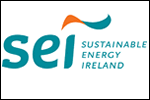- Heating
- Posted
Increase in energy use in Irish buildings despite recession

Rising energy use in buildings contributed to an increase of 1.5% in overall energy demand in 2008, despite the economy contracting by 3% over the same period, a new report from Sustainable Energy Ireland (SEI) reveals today.
Rising energy use in buildings contributed to an increase of 1.5% in overall energy demand in 2008, despite the economy contracting by 3% over the same period, a new report from Sustainable Energy Ireland (SEI) reveals today.
Energy in Ireland 1990-2008 shows that increased energy for heating as a result of weather patterns in 2008 led to an 8.8% increase in energy use by householders in 2008. This was mirrored by a 7% increase in energy use in the commercial and public services sector, highlighting that the energy efficiency of domestic, commercial and public buildings must remain a priority.
The report also revealed that energy use linked to economic activity declined in 2008 in line with the economic slowdown, with a 5.4% fall in energy use in industry and a first time fall of 1.3% in transport in 2008 mainly due to a decline in freight transport. Imported oil and gas remained the dominant sources of fuel in 2008, accounting for 81% of energy supply. Renewable energy use grew by 21% in 2008, and its contribution to gross electricity consumption was 12%, compared to 9.4% in 2007. This suggests that Ireland is on track to meet its 2010 target of 15%. Overall, renewable energy represented 4.5% of gross final energy use in 2008 and the estimated amount of avoided CO2 emissions from renewables was one and a half times the emissions from coal burned in Ireland in 2008.
Launching the report, SEI chief executive Professor Owen Lewis said: “Energy in Ireland 1990-2008 is a significant report revealing new insights on what drives Ireland’s energy demand and clearly showing where we need to concentrate our efforts. Improving the energy performance of our buildings remains a key priority and the government’s recent budget support for energy retrofits and upgrades will greatly aid this in 2010 and beyond.”
“The report also demonstrates the clear effects of the economic crisis of 2008. The key issue now is what will happen when we come out of this recession? It is critical that the return to economic growth is not matched by a corresponding growth in energy demand. The two must be fundamentally decoupled so that Ireland’s future economic successes are not undermined by unsustainable energy use.”
“As a nation, as individual businesses and as householders, we must continue to make sustainable energy a normal way of life and to aggressively pursue technologies and practices that thrust Ireland into the forefront of the clean, green revolution.”
Energy in Ireland 1990-2008 shows that increased energy for heating as a result of weather patterns in 2008 led to an 8.8% increase in energy use by householders in 2008. This was mirrored by a 7% increase in energy use in the commercial and public services sector, highlighting that the energy efficiency of domestic, commercial and public buildings must remain a priority.
The report also revealed that energy use linked to economic activity declined in 2008 in line with the economic slowdown, with a 5.4% fall in energy use in industry and a first time fall of 1.3% in transport in 2008 mainly due to a decline in freight transport. Imported oil and gas remained the dominant sources of fuel in 2008, accounting for 81% of energy supply. Renewable energy use grew by 21% in 2008, and its contribution to gross electricity consumption was 12%, compared to 9.4% in 2007. This suggests that Ireland is on track to meet its 2010 target of 15%. Overall, renewable energy represented 4.5% of gross final energy use in 2008 and the estimated amount of avoided CO2 emissions from renewables was one and a half times the emissions from coal burned in Ireland in 2008.
Launching the report, SEI chief executive Professor Owen Lewis said: “Energy in Ireland 1990-2008 is a significant report revealing new insights on what drives Ireland’s energy demand and clearly showing where we need to concentrate our efforts. Improving the energy performance of our buildings remains a key priority and the government’s recent budget support for energy retrofits and upgrades will greatly aid this in 2010 and beyond.”
“The report also demonstrates the clear effects of the economic crisis of 2008. The key issue now is what will happen when we come out of this recession? It is critical that the return to economic growth is not matched by a corresponding growth in energy demand. The two must be fundamentally decoupled so that Ireland’s future economic successes are not undermined by unsustainable energy use.”
“As a nation, as individual businesses and as householders, we must continue to make sustainable energy a normal way of life and to aggressively pursue technologies and practices that thrust Ireland into the forefront of the clean, green revolution.”
Last modified on Tuesday, 15 December 2009 12:30






